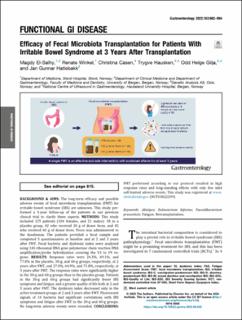| dc.description.abstract | Background & Aims: The long-term efficacy and possible adverse events of fecal microbiota transplantation (FMT) for irritable bowel syndrome (IBS) are unknown. This study performed a 3-year follow-up of the patients in our previous clinical trial to clarify these aspects.
Methods: This study included 125 patients (104 females, and 21 males): 38 in a placebo group, 42 who received 30 g of donor feces, and 45 who received 60 g of donor feces. Feces was administered to the duodenum. The patients provided a fecal sample and completed 5 questionnaires at baseline and at 2 and 3 years after FMT. Fecal bacteria and dysbiosis index were analyzed using 16S ribosomal RNA gene polymerase chain reaction DNA amplification/probe hybridization covering the V3 to V9 regions.
Results: Response rates were 26.3%, 69.1%, and 77.8% in the placebo, 30-g, and 60-g groups, respectively, at 2 years after FMT, and 27.0%, 64.9%, and 71.8%, respectively, at 3 years after FMT. The response rates were significantly higher in the 30-g and 60-g groups than in the placebo group. Patients in the 30-g and 60-g groups had significantly fewer IBS symptoms and fatigue, and a greater quality of life both at 2 and 3 years after FMT. The dysbiosis index decreased only in the active treatment groups at 2 and 3 years after FMT. Fluorescent signals of 10 bacteria had significant correlations with IBS symptoms and fatigue after FMT in the 30-g and 60-g groups. No long-term adverse events were recorded.
Conclusions: FMT performed according to our protocol resulted in high response rates and long-standing effects with only few mild self-limited adverse events. | en_US |

